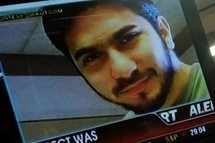From the American dream to bomb nightmare
Sebastian Smith
NEW YORK, Sebastian Smith- Two worlds converged in Faisal Shahzad -- middle class America and jihadist Pakistan -- and when they collided, disaster ensued.
Until last Saturday, when Shahzad allegedly attempted to blow apart tourists and theatergoers in New York's Times Square, his fellow Americans had seen only one side of the tormented 30-year-old.
"Quiet," "nice," "normal," were the words former neighbors used in his former neighborhood in leafy Shelton, Connecticut.

An image of Faisal Shahzad is shown on a television screen during a press conference at the US Justice Department in Washington.
And on April 17, 2009, he reached a huge milestone, receiving US citizenship. He was now literally like everyone else.
"A normal dude," the Daily News quoted former neighbor George Lamonica as saying. "You wouldn't have looked at him twice."
For now, the public has little idea what made that "normal dude" allegedly return to Pakistan last year, train in the Taliban hotbed of Waziristan and fly back to try using a car bomb to commit mass murder in Times Square.
The switch might even seem incomprehensible.
Shahzad, a fit, smiling man with a trim beard and short hair, entered the United States on a student visa in the late 1990s.
He collected a bachelor's degree, an MBA and a job as a junior financial consultant.
He married Huma Mian, born in a Pakistani family from Colorado, and bought a two-story Colonial-style home in suburban Connecticut in 2004, where they raised a daughter and son.
A photo snapshot shows the loving couple, smiling arm in arm, outside New York's Saint Patrick's Cathedral. Another shows him cradling a newborn child.
"He's my everything," Mian wrote in a poignant entry on a social networking site.
With her University of Colorado business degree, Mian was also the model of a modern US Muslim wife.
"Fashion, shoes, bags, shopping," were her passions, she said on a social networking site. "And of course Faisal."
"I cannot believe how well they blended in," another former neighbor in Shelton, Donna Achille, told the Hartford Courant.
But a terrible rift was opening under the couple's placid exterior.
One problem was as all-American as everything else: debt.
Shahzad tried to cash in on the housing boom and sell the house at a tidy profit in 2006, The New York Times reported. But no one bought.
By 2008, with the country in deep economic crisis, the house -- bought originally for 273,000 dollars with a 218,400 dollar mortgage -- was a crippling burden.
In 2009, Shahzad resigned from his job at Affinion Group, a financial market services company, The New York Times reported, and his house slid into foreclosure. As of late April, a total of 212,870.26 dollars was still owed, Newsday reported.
And now Shahzad's other world -- a world seemingly unreachable from Connecticut -- allegedly began to exert its fatal pull.
According to the criminal complaint filed shortly after Shahzad's dramatic arrest at New York's JFK Airport on Tuesday, he and his family went to Pakistan in late 2009.
Behind them, the house that had bankrupted them was left in a mess, filled with spoiled food and belongings, a real estate broker told The New York Times.
Five months later, on February 3, Shahzad returned to US soil -- alone.
He told immigration officials he'd been visiting family back in Pakistan.
Maybe he had. His mother and father, a highly decorated Pakistani Air Force officer, live in a two-story marble-fronted house in an upscale part of Peshawar.
But prosecutors say Shahzad admitted after his arrest that he'd also gone to another part of the country -- the wilds of Waziristan, where he received "bomb-making training."
No one knows why Shahzad may have taken such a huge step. He has yet to appear in court and has not entered a plea.
But one explanation came soon after the failed Times Square bombing: a claim of responsibility by militant group Tehreek-e-Taliban Pakistan.
The Taliban group said Shahzad's car bomb attempt was revenge for US drone attacks regularly killing anti-US insurgent leaders, as well as civilians, in Pakistan.
US officials immediately dismissed the claim, but Pakistani Foreign Minister Shah Mehmood Qureshi says it would be "naive" to think the hidden war in Waziristan won't come back to haunt the United States.
"This is retaliation," he said on CBS television.
International terrorism expert Thomas Sanderson, at the Center for Strategic and International Studies, said Shahzad gave every sign of someone coming late to underground militancy.
"He is clearly an amateur and not a true believer," Sanderson said.
How this quiet American allegedly wound up driving that car bomb -- and how many other struggling Muslim immigrants might follow -- are questions interrogators are desperate to answer.
-----------------------------------------------------------------------------